What learnings do business leaders believe CEOS and CFOs should take into the new normal?
First-hand experience is the greatest teacher anyone can have. Advice from those who have been there and done it can provide aspirational entrepreneurs and business leaders with critical insights, lessons, and food for thought.
The following pearls of wisdom should help to unlock new ways of thinking for business leaders whose organisation has been impacted by world events.
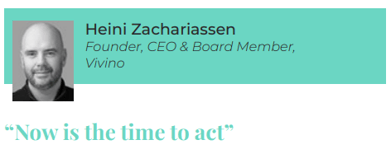
"Everything is going to change at this point. We’ve seen it, a lot of industries have seen it, and a lot of things that we thought would take 10 years to change are now changing in 10 days.
The hit we thought retail was going to take over the next few years, it’s happening right now. And they are shutting down right now. It’s rough but it’s also an opportunity.
I think there’s a long-term shift going on and I think this is for all of eCommerce. There’s a big shift coming and it’s going to reach critical mass. And that’s going to accelerate growth even more.
So, I would say ‘this is the time’. Real shifts happen when you see earthquakes like this one. There’s no better time to start a business than right now, there’s no better time to shake everything up and change things. That’s my message."
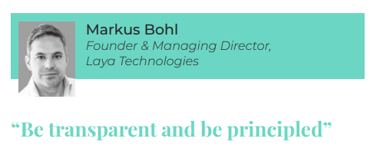
"One thing I would say is to embrace full transparency towards the employees. Everybody understands the crisis isn’t the business’s fault and isn’t on us. Equally, everybody understands that these things are going to have a severe impact economically and financially on everyone. This was a learning curve for me: people really understand. If you give them a little bit of guidance, then they really understand that you’re trying to help.
I always think the cultural thing is most important here. The better your culture and the better the cohesion between your team, then the better you can manoeuvre challenging periods.
People really appreciated that we were supporting them financially as much as we could and we’re going to extend that even for those who need a bit longer to find a new job. This was something where we really learned a lot. You have to take principled decisions even if they are not popular - so long as you explain them."
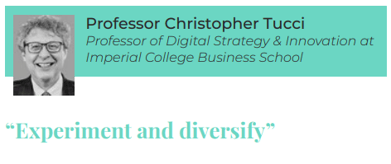
"You need to run small experiments in parallel. It’s important to be reactive and to be able to manoeuvre and be resilient. If your performance is suffering, don’t be too narrow-minded about what you need to do.
Rather than a massive pivot, if you’re willing to change then try to keep costs down. Make low commitment experiments. Try different things. See what catches on. And then you can decide to shift and put more money into that growing business instead of trying to stay the course, which is just stubbornness or complacency.
It’s hard to know what may gain traction, so try and come up with different prototypes or several small things that you can test in the market here
and there - it’s not going to cost a huge amount of money. That is going to enable you to pick something and move in a particular direction.
My one piece of advice is don't be complacent or stubborn, especially in the face of bad performance - it’s better to think about new opportunities than to soldier on doing the same thing that people don’t appear to want right now."
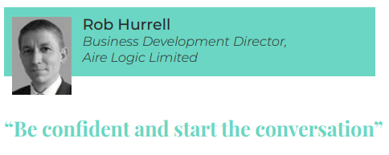
"Jump in and begin the conversation with customers and potential clients. Nobody has the answers, and nobody knows right now what things are going to look like.
What we’ve found is simply having that conversation and having trust in your capabilities as a company, you can find a way to meet the needs of customers and improve their ways of working.
It’s largely embracing that uncertainty and saying “I’m sure there’s something we can do here, but we’re not exactly sure what it looks like” - that’s the new way of the world. We’re living in a time of uncertainty and I don’t think that’s necessarily going to change, even when some of the immediate challenges subside.
We can’t always scope, we can’t always predict. But you need to have enough self-belief and confidence in your approach that this is going to work well for you and well for the client, that’s the biggest take away I suppose. That’s the new way of working."
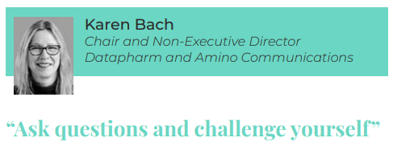
"There are three things a business comes down to: cash, sales, and people. For the past six months, companies have focused on cash and looking after their people. Now it’s time to focus on sales and their gross - and that means asking questions and challenging yourself.
A lot of tech companies have had to take a step back and ask ‘is my business model what I thought it was? Am I as resilient as I thought I was? Should I now be diversifying my sector?’
At heart, most people are resistant to change, but right now businesses have a clear impetus and rationale to embrace change - and that is key.
The worst thing companies can do is go back to what they were doing before and NOT challenge themselves, and not ask themselves ‘what if we did this?’. They have to change, and they have to challenge themselves."

"Fundraising is arduous in any circumstances. For first timers it’s difficult, at fund level it’s even more so. So, in any challenging period, you need to be better, more creative, and do your homework on what you are getting into.
I’ve seen - as a professor, a guide, a mentor - too many people when it was too easy during the time of web 2.0 and the dot com, leaving their jobs with an idea and having some kind of app or community or social media and 99% of them died. It’s easy to get caught up, but it is wrong for people to take such action if they have responsibilities to themselves, such as families.
I think people should be more disciplined and more protective in these times. You’ve really got to do your homework. This will increase your odds of survival."
Read the full e-book below

